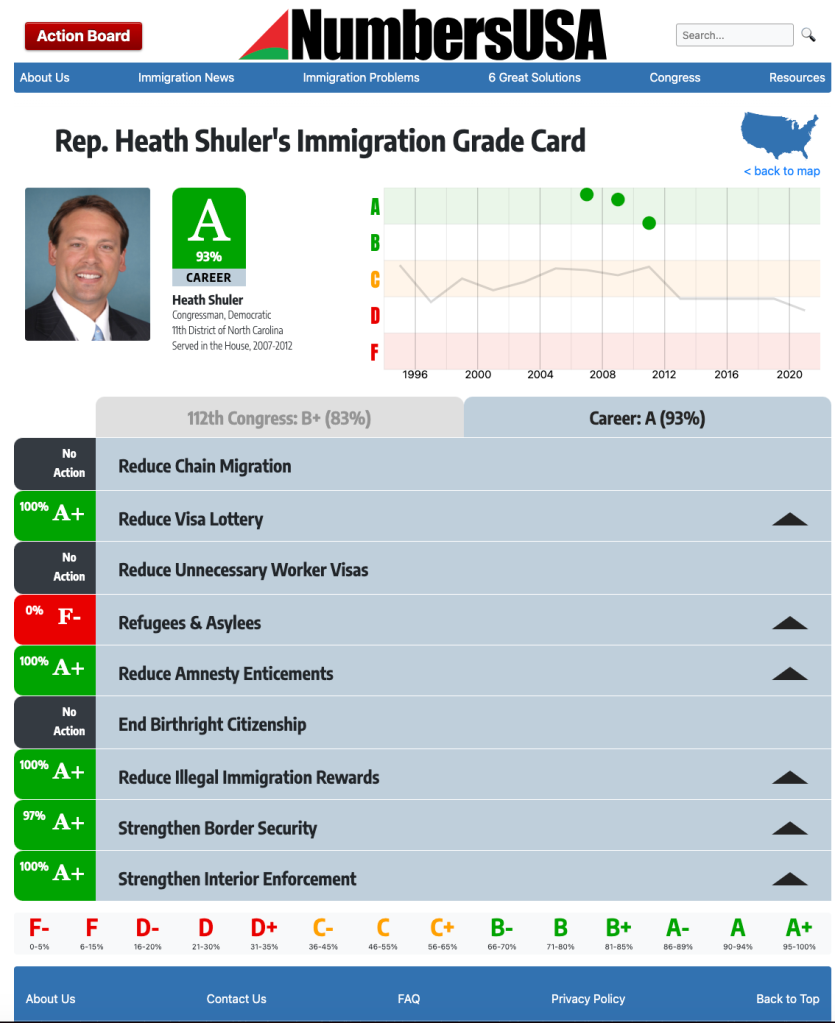NumbersUSA History
Discover the origin and history of NumbersUSA. Uncover how a website to promote the immigration recommendations of two federal commissions grew to become the largest online, single-issue, grassroots advocacy group in America.
Four Pillars of NumbersUSANumbersUSA was founded in 1996 by journalist/author Roy Beck. The organization facilitates civil debate on the immigration recommendations of two prominent federal commissions. In the early days, a small staff harnessed emerging internet technology (faxes!) to influence lawmakers. Today, NumbersUSA is the largest single-issue advocacy group in the United States.
Roy Beck created and financed NumbersUSA first as a website in December 1996, after a year of lugging around his famous charts and gumballs demonstration in a nationwide media tour promoting his latest book, published by W.W. Norton & Co. The Case Against Immigration — The Moral, Economic, Social, and Environmental Reasons for Reducing U.S. Immigration Back to Traditional Levels is an on-the-ground journalistic investigation with conclusions similar to policy recommendations of two distinguished federal commissions of that period.
Along with Anne Manetas, Jim Robb, and Rosemary Jenks, he eventually expanded the website into two full-fledged nonprofits, the NumbersUSA Education & Research Foundation and NumbersUSA Action. In the spirit of a civil forum, NumbersUSA from its beginning admonished those who were upset about immigration policy not to direct their frustration toward immigrants but toward Congress, the body that sets the policy. A new way to do that was just becoming possible in 1996 as the internet was becoming available to the broad public.
NumbersUSA worked with the concept of a website that empowered voters with both knowledge and tools to communicate directly to their elected officials. Although antiquated today, the original “SEND FAX” capability of NumbersUSA was a breakthrough use of old and new technology which allowed those who visited the website to send a fax, via the services provided by NumbersUSA, directly to their elected officials. NumbersUSA was the first grassroots advocacy organization to provide citizens that much-needed opportunity to make its voice heard in the immigration debate; until that time, Congress mostly heard from Big Business and other special interest groups who lobbied for immigration expansions.
While the technology is different today, the focus of the organization remains the same — empower voters to communicate with their elected officials to achieve a sensible immigration policy.
Over its first decade, NumbersUSA’s membership grew rapidly into every county in the nation. It was propelled by the popularity of its ethical approach and policy recommendations that rose out of the four highly public “pillars” upon which NumbersUSA was built:

A special NumbersUSA mission from the beginning was to keep alive the immigration vision of Barbara Jordan. Her untimely death early in 1996 had opened the door for special-interest lobbies. Under their pressure, just enough Members of Congress were persuaded to change their positions. Jordan ultimately lost her personal struggle with diabetes and multiple sclerosis. Not long after, the so-called “Jordan Commission’s” reforms of legal immigration were stripped from the final bill. Political leaders rushed to declare the immigration issue settled, and the mass media went along with it.

Rep. Lamar Smith had been the lead congressional advocate for the whole of the commission’s recommendations. He introduced the Illegal Immigration Reform and Immigration Responsiblity Act (IIRIRA) of 1996. And he shepherded it into law. Although stripped by others of its legal reforms, the law included many of the commission’s recommendations to strengthen enforcement. IIRIRA created a pilot program that became the E-Verify system that helps employers avoid hiring illegal foreign workers. That alone was one of the Jordan Commission’s top recommendations. NumbersUSA worked with Republican Smith over the next two decades, until his retirement. Together, they promoted the unfulfilled recommendations of his fellow Texan and her bipartisan commission. NumbersUSA continues to advocate for reduced annual legal immigration and to make the E-Verify system mandatory for all employers.

In the late 1990s, NumbersUSA introduced the country’s first immigration report cards. The new tool empowered citizens and journalists to track congressional activity on immigration. Each Member of Congress received a letter grade. Members with higher grades were aligned with the immigration recommendations of the two federal commissions.
The online reports had a record and a page for each Member of Congress since 1990. The record included every vote on the floor or in committee, and every cosponsorship, on every bill that influenced — or would have influenced — the numerical level of either legal or illegal immigration.
NumbersUSA Grade Cards quickly became the most used and quoted source of that information. They are an essential tool for tracking immigration votes, regardless of a user’s position on immigration policy.
At a conference at the University of Southern California a few blocks from the 2000 Democratic National Convention, NumbersUSA presented its first study of the environmental consequences of the failure to pursue the immigration recommendation of the retiring Pres. Clinton’s Council on Sustainable Development. More than a dozen national, state, and regional studies have followed, establishing NumbersUSA as the nation’s premier research repository on the role of population growth (and particularly that driven by immigration) in urban sprawl and the loss of natural habitat and farmland, as well as challenges to many Americans’ quality of life. Our sprawl studies have been cited in scholarly literature over a hundred times in a dozen languages.

In the years following the September 11, 2001 terrorist attacks, NumbersUSA operated primarily beneath the media radar as it educated larger and larger numbers of internet users and Members of Congress about concerted efforts to weaken the 1996 law’s enforcement provisions and about the need for additional security provisions. In the end, Congress did not weaken enforcement laws and it did enact major new immigration security measures, culminating in the REAL ID Act of 2005 to close enforcement loopholes that the 9/11 terrorists had exploited. For four years, NumbersUSA had worked with 9/11 victim families and congressional staff to fashion the legislation and to educate the public about it.
In 2006-7 and again in 2010-12, NumbersUSA shocked the experts by stopping immigration bills heavily favored by lobbyists. The bills were antithetical to the recommendations of the federal commissions. Each bill would have greatly increased annual immigration and issued permanent work permits to people illegally present and working in the country. American voters responded with overwhelming mobilization to overcome the strong support from special interests.

In 2007, NumbersUSA’s pattern of operating with little publicity disappeared under the bright spotlight of national media.
The New York Times was the first to credit NumbersUSA with derailing the legislative priority of Pres. George W. Bush and Senators Ted Kennedy (D-Mass.) and John McCain (R-Ariz.) that would have expanded annual legal immigration and granted amnesty to millions of illegal foreign workers. Citizens mobilized by NumbersUSA responded in such volume that they shut down the congressional switchboard.
Senator Mitch McConnell (R-KY), who had been leading the President’s effort to pass the bill said he changed his vote to “no” because his constituents had communicated such strong opposition to the amnesty and immigration expansion.
NumbersUSA built on its 2006-07 victory by expanding its online membership to more than 2 million by 2012. Alarmed, immigration-expansion advocates sought to blunt NumbersUSA’s influence with a years-long, well-funded campaign of harsh character attacks on NumbersUSA’s founder and NumbersUSA itself, all without evidence from any actual NumbersUSA writing or action.
NumbersUSA persevered the maelstrom of backlash by being open and transparent with its financial information, standard practices, and by pointing to longstanding and still-standing principles displayed on its web site and practiced in its materials that focus on the numerical aspects of immigration while continuing to actively advocate for “no immigrant bashing” and against any racism or nativism in immigration policies
Between 2010-2012, NumbersUSA empowered voters in Arizona, Georgia, Alabama, and other states to achieve state-level immigration enforcement laws, including E-Verify mandates for most businesses. A study conducted by the Federal Reserve Bank of Dallas in 2017 concluded that these state E-Verify laws were highly effective in reducing the illegal alien presence in a state and reducing unauthorized immigrant employment. Although NumbersUSA’s efforts fell just a little short for congressional-mandated nationwide E-Verify for all employers, public pressure was a key element in Pres. Barack Obama’s decision to issue an Executive Order requiring E-Verify for all federal agencies and contractors. Employers now run more than half of all new hires through E-Verify.
In 2013 and 2014, NumbersUSA’s grassroots mobilization of voters was again instrumental in preventing enactment of an amnesty bill (S.744) of the self-labeled “Gang of 8.” Like the 2006-07 legislation, S.744 had prestigious legislative advocates from both Parties, including Senators Chuck Schumer (D-NY), Lindsey Graham (R-SC), John McCain (R-AZ), and Dick Durbin (D-IL). It would have expanded legal immigration, increased guest worker programs and granted amnesty to more than 10 million illegal aliens.
By the 2015-16 presidential campaign, NumbersUSA saw the fruition of its two-decade effort to move Barbara Jordan’s vision of immigration reform back into a national discussion. Immigration policy was a top debate issue; especially in the Primaries. Candidates frequently raised E-Verify, family Chain Migration, and the Visa Lottery. The Jordan Commission raised the same concerns twenty years earlier. NumbersUSA ran TV ads during nearly all the debates of both Parties’ Primaries as well as during the general election campaign. Most of the ads featured Barbara Jordan.
Voters used the NumbersUSA Immigration Grade Cards to track where their members of Congress stood on the hot immigration issue of the times. By then, NumbersUSA had filled its public archive with tens of thousands of actions; the Grade Cards were another of the nation’s premier repositories of critical information provided by NumbersUSA. As it became more fashionable for politicians to claim a record of supporting border security and protections for American workers, journalists and citizens could quickly determine if past actions supported or refuted the politician’s reputed record.
NumbersUSA worked closely with congressional offices of both House and Senate for the introduction of legislation that included most Jordan Commission recommendations that received floor votes in 2018 for the first time since 1996. But, as in the defeat of 1996, top leaders of both Parties were able to block the bills, bowing to the wishes of lobbies representing those who gain profits and influence from high levels of immigration.
The organization experienced another major victory in 2021 when the very real danger of an amnesty in the budget reconciliation was averted, due in large part to a sustained phone call campaign on the part of NumbersUSA activists opposing the inclusion of any amnesty.
NumbersUSA has continued its strong position of influence with Congress on federal immigration legislation and has formalized a state level initiative to bring mandatory E-Verify to a majority of states. This initiative gained rapid traction in July of 2023 in Florida with passage of S.B. 1718 which had E-Verify as a centerpiece of immigration legislation. This strong legislation expands the use of E-Verify to private employers with 25 or more employees covering 90% of all employees in Florida. Similar legislation was considered in Texas in 2023, and in West Virginia, where the state Senate unanimously passed an E-Verify bill but without state House approval in 2023.
The Hiring Line Initiative which is intended to address the economic justice concerns for those US citizens disproportionately impacted by high immigration levels. Based on the most recent book written by founder Roy Beck, Back of the Hiring Line, a 200-year history of immigration surges, employer bias, and depression of Black wealth, NumbersUSA is working with Black leaders and voters whose communities and jobs are being negatively impacted.
Today, NumbersUSA continues to build on its quarter-century history of reaching across the breadth of conservative, centrist, and liberal Americans to empower voters to achieve a sensible immigration policy. This includes those whose immigration concerns run from restoration of the rule of law, to prioritizing the national interest, to leveling the playing field and reducing inequality for the working classes and especially the descendants of American slavery, to the impact that immigration-driven population growth has on the environment, conservation, and sustainability. Together, we believe better immigration policy is possible.
Jump to







